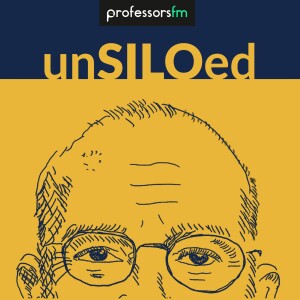
440. Whistleblowing in Medical Research with Carl Elliott
 2024-07-15
2024-07-15
Despite the Hippocratic Oath of “do no harm” that all physicians take, a dark side exists in the medical field.
Carl Elliott is a professor of philosophy who teaches bioethics at the University of Minnesota. His latest book, The Occasional Human Sacrifice: Medical Experimentation and the Price of Saying No, shares the stories of some of the most egregious cases of medical abuse in history and the whistleblowers who tried to stop it.
Carl and Greg chat about his own experience blowing the whistle after a psychiatric study went awry, the factors present in the medical field that lead to unethical and abusive studies, and the cost of deciding to take a stand.
*unSILOed Podcast is produced by University FM.*
Episode Quotes:
On protecting vulnerable populations in research
19:16: One of the things that you see running through, I would say, at least 90% of the scandals that we look at in the class that I teach on research scandals, is that you're dealing with research subjects who are vulnerable in some way. They're often poor, they're uneducated, they're institutionalized, they're mentally ill, they're children, they're mentally disabled, they're unable to look out for their own interests in the way that an ordinary competent adult is. And those populations are easily exploitable. We should have protections for those people—serious protections. We have, in our honor code, the Common Rule; there are federal guidelines that say this: you need to take special care with vulnerable populations.
Is an honor system enough for medical research?
14:18: In other businesses out there, factories, restaurants, mines, fisheries, and so on, you have a regulatory system, like a full-blown regulatory system with inspections, safety rules, and so on. There's nothing like that in medical research. The oversight system is an honor system. Medical researchers are just trusted to behave honorably and honestly. And I think there are real questions about whether an honor system is up to the task of overseeing and doing the regulatory, quasi-regulatory job of managing what is now a multinational global multi-billion dollar industry.
Do we sometimes confuse the organization's purpose and the people in the organization? What and how does this idea of organizational loyalty play out?
32:22: It's really institutional loyalty, at least in academic medicine, and not loyalty to some higher mission—in the case of academic medicine, to the sort of humanitarian effort of doing medical research. Because I do think that there is this sense of physicians who have chosen to work in academic health centers rather than do like the vast majority and work out in the community somewhere, there's a reason for that. And the reason is science and medical advances and the many people that you could reach by developing new and better treatments, right? I mean, it's that tension between those humanitarian goals of the enterprise as a whole and the interests of individual patients that needs to be balanced.
The toxic mix of research funding and authoritarian hierarchy
13:46: There's a very rigid status hierarchy; it's extremely authoritarian and competitive. The coin of the realm is not patient care; it is research, particularly now research funding. In fact, research funding is more important than the actual research. And so, you can see, when you put all these things together, you have a very toxic mix.
Show Links:
Recommended Resources:
- Nuremberg Code
- Tuskegee Study
- Willowbrook State School
- Cartwright Inquiry
- Paolo Macchiarini
- Listening to Prozac: The Landmark Book About Antidepressants and the Remaking of the Self by Peter Kramer
- Alexis de Tocqueville
Guest Profile:
- Faculty Profile at University of Minnesota
- Professional Website
His Work:
- The Occasional Human Sacrifice: Medical Experimentation and the Price of Saying No
- White Coat, Black Hat: Adventures on the Dark Side of Medicine
- Better Than Well: American Medicine Meets the American Dream
More Episodes
Create your
podcast in
minutes
- Full-featured podcast site
- Unlimited storage and bandwidth
- Comprehensive podcast stats
- Distribute to Apple Podcasts, Spotify, and more
- Make money with your podcast
It is Free
- Privacy Policy
- Cookie Policy
- Terms of Use
- Consent Preferences
- Copyright © 2015-2024 Podbean.com






